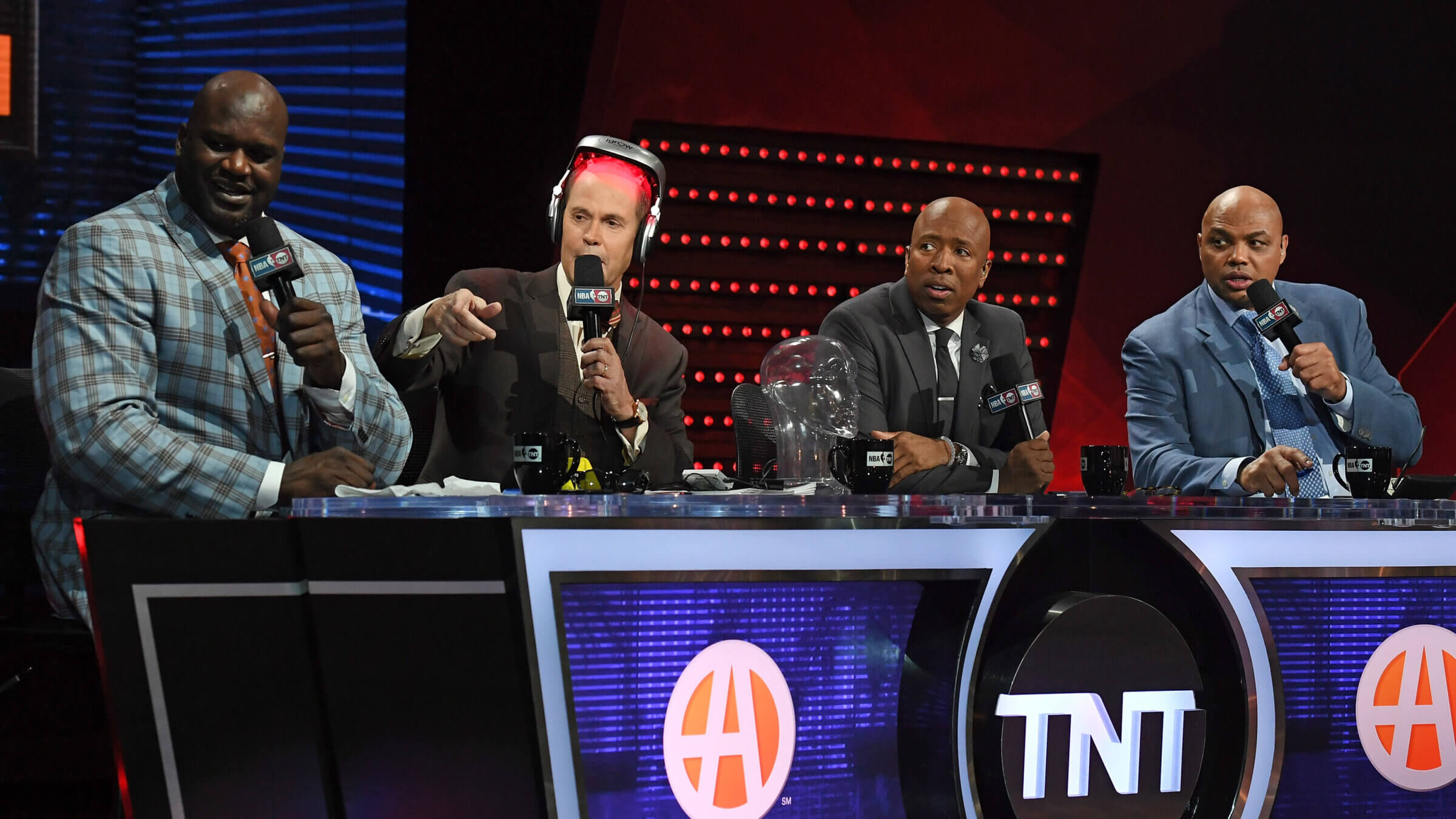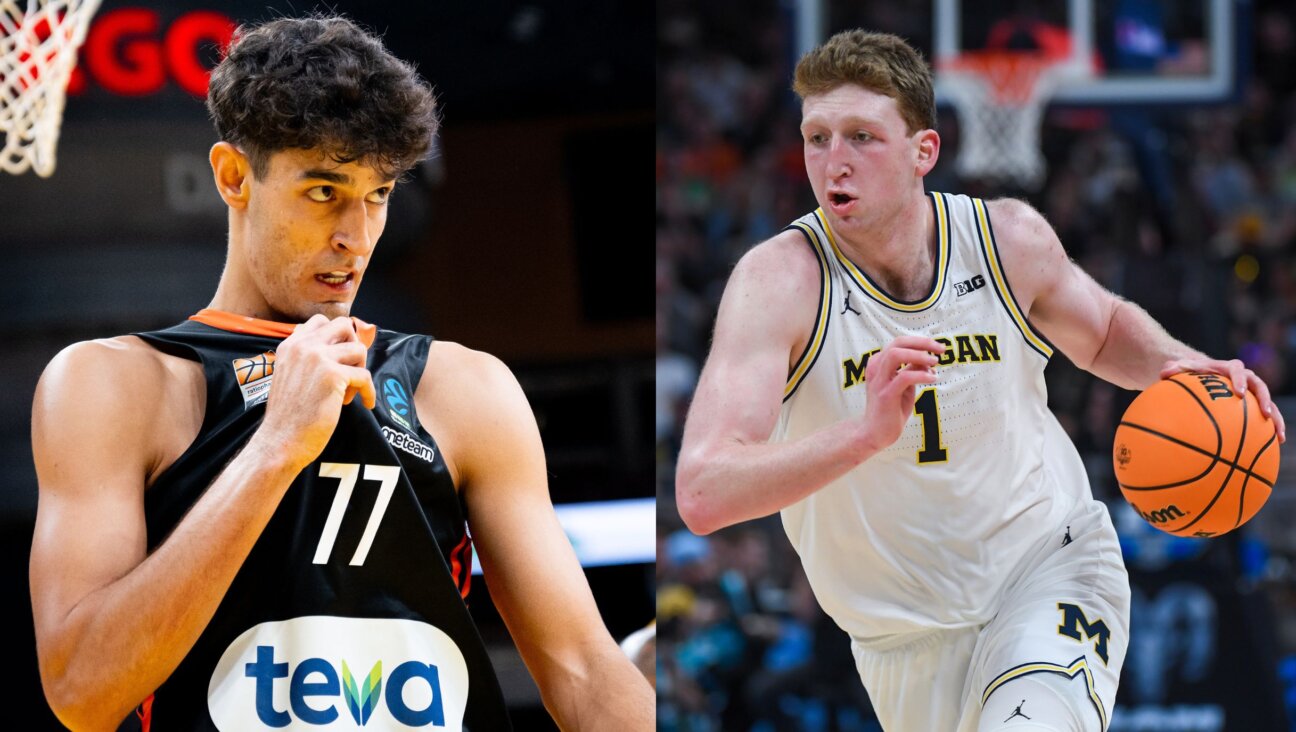‘Inside the NBA’ was good for the Jews
After Kyrie Irving shared an antisemitic movie, the NBA’s court jesters got serious

TNT’s Inside the NBA team: from left, Shaquille O’Neal, Ernie Johnson Jr. (wearing a prop), Kenny Smith and Charles Barkley. Photo by Ethan Miller/Getty Images
Which network broadcasts basketball games may not seem like a big deal. But if the NBA indeed ditches TNT, as news reports suggest it will, many fans will mourn the loss of “Inside the NBA,” the network’s show featuring a lovably goofy and relentlessly candid panel of retired stars.
As they should. “Inside the NBA,” which aired at halftime and postgame of TNT broadcasts, was a regular riot. It will be remembered for Charles Barkley and Shaquille O’Neal trading barbs, Kenny Smith playing petulant middle-child and host Ernie Johnson’s whimsical closing segments. But the show’s willingness to provide sobriety at crucial moments may be harder to replace.
Never was that clarity more evident, or required, than when one of the sport’s biggest stars shared a movie that claimed Jews had used slavery to usurp Jewish identity from Black people and invented the Holocaust to cover it up. Kyrie Irving’s vulnerability to nonsense was well-documented, and the notion of a man in his 30s believing the earth was flat made his views almost laughable. At the same time, Irving’s on-court brilliance and sterling community service record had also made him beloved in the league’s ranks.
In the week between when he posted the link to “Hebrews to Negroes: Wake Up Black America” and when the NBA suspended him, Irving dug in. He denied that sharing a link to a movie with his 5 million Twitter followers was the same thing as promoting it. He declined to disavow its contents. Then, a reporter asked Irving if he is antisemitic and, in a bizarre exchange watched millions of times online, he said: “I cannot be antisemitic if I know where I come from.”
The “Inside” crew discussed the Irving saga as plainly as they talked about games. Barkley called the seven-time all-star an “idiot” and called on the league to suspend him. So did O’Neal, adding, “It’s obvious by his answers that he doesn’t really care.” Johnson rejected any distinction between sharing a link and promotion. And he mourned: “As a society, we’ve lost our way,” he said. (The NBA suspended Irving two days later.)
If those comments sound like layups — who wouldn’t condemn antisemitism? — it’s worth looking at what other voices around the NBA were saying at the time. LeBron James called the league’s punishment of Irving — an indefinite suspension with the requirement he attend sensitivity training and meet with Jewish leaders and the ADL — “excessive.” The Celtics’ Jaylen Brown, the president of the players’ union, called it “alarming.” No one in the league used the moment to explain why the conspiracy theory was offensive, or tried to debunk it.
ESPN has an NBA studio show, too, called “NBA Today.” That show, featuring a younger cohort of former players, brought in a guest to discuss Irving, Rabbi Erez Sherman of Sinai Temple in Los Angeles. Rabbi Sherman used the occasion to invite Irving to services at his synagogue and when he asked the host, Malika Andrews, to share her thoughts as a Black and Jewish woman, she demurred. The program seemed to miss that, unlike a rabbi invited on for a single segment, panelists can be nearly as influential as the superstars they cover.
The comments of Barkley and co. were a trump card they typically reserved: a firm, almost paternal reminder that the sport had a moral responsibility to the public. And they were a reminder that the role of a broadcaster isn’t just to amplify the fun of what’s on the court, but to publicly interrogate and rebuke who or whatever detracts from it. It wasn’t just Irving that got this treatment from “Inside”: the crew ripped another star, Ja Morant, after he was filmed brandishing a gun, and condemned former Clippers owner Donald Sterling after his racist rant was leaked; Barkley went off-script earlier this season to confront commissioner Adam Silver on the league’s handling of domestic violence incidents.
Today, partly because of the success of “Inside the NBA,” sports studio panels are littered with ex-players who bring personality, insight and star appeal. But that connection to the game can sometimes soften coverage of its biggest names. In this ethically murky landscape, the “Inside” crew stood out. The primary ingredient in their formula was blunt honesty. If a player stunk that night, they’d tell you. And if they’d never heard of a player before he made the game-winning shot, they’d tell you that, too.
The show wasn’t without blemish — with DraftKings a program sponsor, the panelists have recently been shilling in-game bets — but it never affected holiness, either, just honesty. That’s why the NBA’s class clowns could dish on Irving, and why people listened when they did. In a media environment increasingly prone to obfuscating truth for the sake of protecting stars, the “Inside the NBA” crew never did.
























